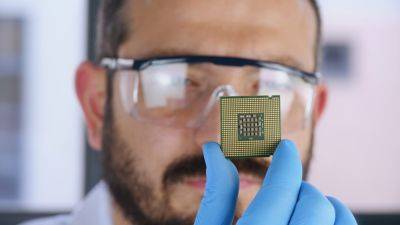Surging AI demand could cause the world's next chip shortage, research says
A surge in demand for artificial intelligence-focused semiconductors and AI-enabled smartphones and laptops could lead to the next global chip shortage, according to a report released Wednesday by consultancy Bain & Co.
The last major semiconductor shortage happened during the Covid-19 pandemic amid supply chain disruption and a rise in demand for consumer electronics as people were forced to stay and work at home.
Technology giants have been snapping up graphics processing units, or GPUs, mainly from Nvidia. These GPUs which are housed in data centers are critical for the training of huge AI models which underpin applications like OpenAI's ChatGPT.
Meanwhile, companies like Qualcomm are designing chips that go into smartphones and personal computers and allow those devices to run AI applications locally rather than via an internet connection in the cloud. These are often referred to as AI-enabled devices and companies from Samsung to Microsoft have released such products.
Bain said demand for GPUs and AI consumer electronics could be the cause of a chip shortage.
"Surging demand for graphics processing units (GPUs) has caused shortages in specific elements of the semiconductor value chain," Anne Hoecker, head of the technology practice in the Americas at Bain, told CNBC by email.
"If we combine the growth in demand for GPUs alongside a wave of AI-enabled devices, which could accelerate PC product refresh cycles, there could be more widespread constraints on semiconductor supply."
However, it's unclear at this point how much demand such AI-enabled gadgets will have, given what appears to be a cautious approach to them from consumers so far.
Bain noted that the semiconductor supply chain is "incredibly complex, and a demand







